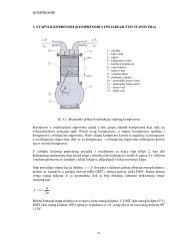universityâenterprise cooperation
universityâenterprise cooperation
universityâenterprise cooperation
You also want an ePaper? Increase the reach of your titles
YUMPU automatically turns print PDFs into web optimized ePapers that Google loves.
We would like to suggest that a very important<br />
model of the university-enterprise <strong>cooperation</strong><br />
is collaborative research, mobility and<br />
networking through FP7 REGPOT or INCO<br />
projects which are especially devoted to<br />
WBC region or convergence regions.<br />
The primary objectives of enterprises to collaborate<br />
with universities, within these projects,<br />
include research synergies, keeping up with<br />
major technological developments and R&D<br />
cost sharing. The increase in their knowledge<br />
base is the greatest reported benefit of firms<br />
from such collaboration. The fact that one of<br />
the main aims of EU policy for the Framework<br />
Programmes is to achieve a techno-economic<br />
convergence among its regions plays to the<br />
advantage of universities from such regions.<br />
The components of this dimension are improvement<br />
to the enterprises’ technological and organizational<br />
capabilities, exploitation of complementary<br />
resources, new knowledge creation and/or<br />
acquisition, and acceleration of research.<br />
Enterprises may also benefit in terms of<br />
developing or improving new or existing<br />
processes or using sophisticated equipment<br />
at universities (or Centers of Excellence) purchased<br />
through above-mentioned FP7 projects.<br />
Universities and enterprises from Western<br />
Balkan region should collaborate within<br />
specially designed program of European<br />
Union called EUREKA, helping make WB<br />
region economically strong and socially<br />
sound. EUREKA is the leading platform for<br />
R&D-performing entrepreneurs in Europe<br />
and beyond. EUREKA R&D is industry-led,<br />
applied, close-to-market — with tangible<br />
results and visible benefits. EUREKA now<br />
unites over 40 member countries. Together,<br />
they promote international, marketoriented<br />
research and innovation through<br />
introducing new products, processes and<br />
services to market. Results stemming from<br />
EUREKA projects are everywhere, such as:<br />
gsm mobile phone technology; navigation<br />
systems; smartcards to support mobile<br />
and electronic commerce; film special<br />
effects software for cinema; state-of-theart<br />
medical devices and technologies to<br />
monitor and limit environmental pollution.<br />
EUREKA Clusters are long-term, strategically<br />
significant public-private partnerships. Most<br />
of Europe’s leading companies participate<br />
in EUREKA Clusters, developing generic<br />
technologies of key importance to European<br />
competitiveness. EUREKA Umbrellas are<br />
thematic networks that focus on a particular<br />
technology or business sector. Their goal<br />
is to generate and support R&D projects in<br />
their specific field of operation.<br />
EUREKA’s Eurostars Programme is the first<br />
European funding and support programme<br />
to be specifically dedicated to researchperforming<br />
SMEs. Eurostars stimulates them to<br />
lead international collaborative research and<br />
innovation projects. The Eurostars mission is<br />
to support R&D-performing entrepreneurs,<br />
by funding their research activities, enabling<br />
them to compete internationally and become<br />
leaders in their sector.<br />
In the near future, very concrete steps<br />
should to be performed with the aim to build<br />
consortia (including academic and industry<br />
organizations from WBC) in order to prepare<br />
project proposals for EUREKA or Eurostars<br />
programme. This TEMPUS project can be<br />
very good basis to initiate preparing these<br />
proposals and building successful consortia.<br />
6.3.4 Establishment of regional Collaborativetraining<br />
and/or Life-long Learning centres<br />
Establishment of Collaborative Training<br />
Centres (CTCs) at university level, as the<br />
university-enterprise links, can provide<br />
efficient and sustainable <strong>cooperation</strong><br />
among the key actors of the knowledge<br />
triangle. Commercialization of R&D results,<br />
innovation and educational services are<br />
main activities of CTCs, developed on the basis<br />
of SWOT analysis and appropriate action plan,<br />
for at least three year. Market activities are<br />
important for visibility of CTCs, and should<br />
include analysis of potential users’ attitudes,<br />
i.e. significant factors that influence the<br />
decision of enterprises and SMEs, unemployed<br />
graduates, to take part in CTC trainings and<br />
use its services. The important activities which<br />
can be undertaken to that purpose are:<br />
• Identification of training and service<br />
needs (TSNA) in the target region of WBC;<br />
• Estimation and categorisation of trainings<br />
111<br />
New WBC model of university-enterprise <strong>cooperation</strong> 6
















